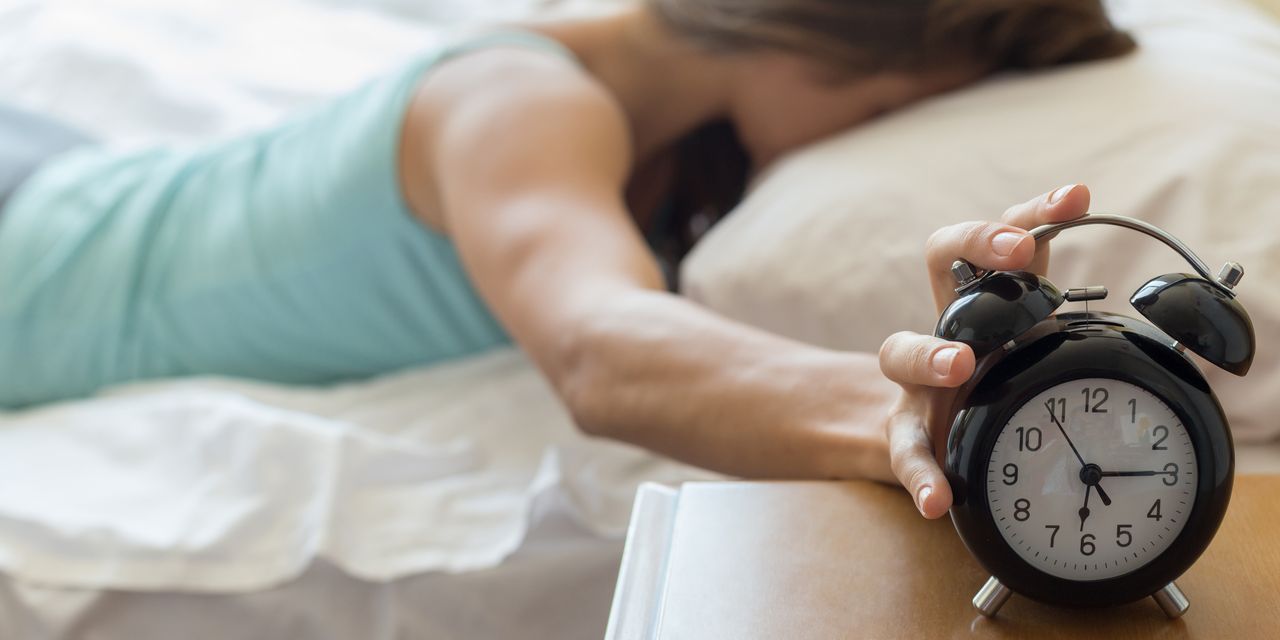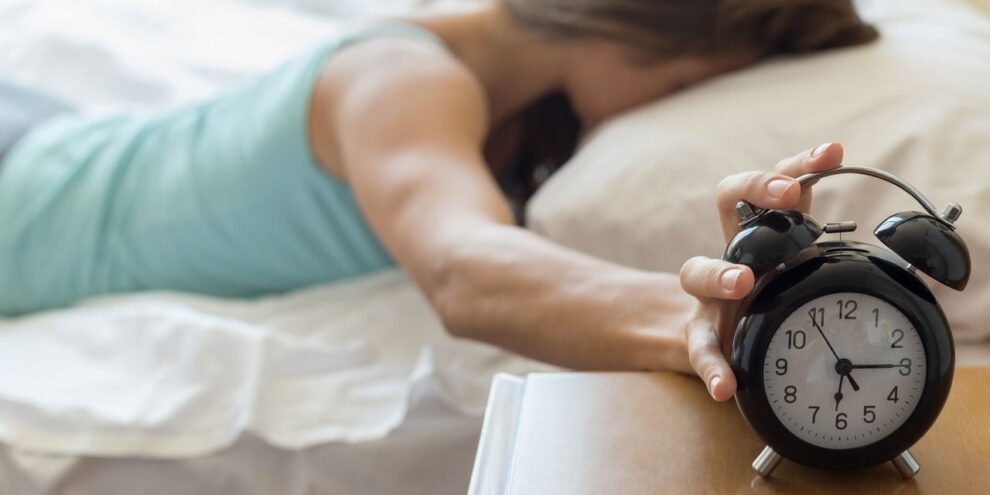
Why does springing forward during daylight-saving time make so many of us want to fall back into bed?
There’s more that’s making us groggy after changing the clocks than simply losing an hour of shuteye, sleep experts say — although that is certainly part of it. Turning the clocks ahead from 2 a.m. to 3 a.m. this Sunday to maximize the sunlight in the Northern Hemisphere throws many people off their game for a few reasons.
Read more: When do we change our clocks? 6 things worth knowing about daylight-saving time
First, daylight-saving time puts our daily work and school schedules even more out of sync with our internal body clocks than they might already be. This is because we start getting less sunlight in the morning and more sunlight in the evening, which is the total opposite of what sleep experts recommend.
“The best situation for our sleep is when we get exposure to bright daylight in the morning, and then we have milder light and darkness in the evenings,” Joe Dzierzewski, the National Sleep Foundation’s vice president of research and scientific affairs, told MarketWatch. “During daylight-saving time, the situation is really flipped around. And this mismatch is greater during daylight-saving time [in the spring and summer] than during standard time [in the fall and winter].”
So as a result of our bodies falling out of rhythm with the sun, it’s common to feel more tired than usual in the morning when we’re trying to wake up, and more wide awake in the evening when we’re trying to wind down.
Plus, many of us are already sleep deprived, which is another reason losing an hour of sleep on a Saturday night can have so many folks struggling to wake up for work the following Monday and Tuesday, and maybe feeling jet-lagged in the week or so afterward. “The typical American adult right now is already not achieving the recommended seven to nine hours of sleep per night,” Dzierzewski said. “So if you remove an hour from an individual who is already maybe under-sleeping, that can certainly be problematic.”
And this fatigue can impact physical and mental health. The American Academy of Sleep Medicine (AASM) warns that the change to daylight-saving time in the spring is associated with an increased risk of motor vehicle accidents, cardiovascular events and mood disturbances; an increased risk of stroke and hospital admissions; and increased production of inflammatory markers, one of the body’s responses to stress. A 2009 study found a link between daylight-saving time and workplace injuries.
Related: Why daylight-saving time and your NCAA ‘March Madness’ bracket threaten your investments
What’s more, the National Sleep Foundation’s most recent Sleep in America Poll, released in time for daylight-saving time and the 25th anniversary of Sleep Awareness Week, found a strong link between sleep and depressive symptoms. Almost seven in 10 adults (65%) in the survey who reported being dissatisfied with their sleep also experienced mild or greater levels of depressive symptoms.
It’s no wonder some groups — including the American Academy of Sleep Medicine and the National Sleep Foundation — have called for scrapping the practice altogether. Six in 10 Americans (61%) would do away with the nation’s twice-a-year time change, according to a Monmouth University poll conducted last year, and keep daylight-saving time year-round (as in, “springing forward” and turning the clocks ahead in spring — and then keeping them there).
Most sleep experts, on the other hand, recommend sticking to standard time after we turn the clocks back in the fall, since it’s a better fit for our natural sleep/wake cycle.
Regardless, leaving the clocks alone is one of the few things many Republicans and Democrats can agree on right now, as a bipartisan bill to make daylight-saving time permanent was recently put before Congress again. Hawaii and Arizona, in fact, don’t change their clocks at all. “This ritual of changing time twice a year is stupid,” Sen. Marco Rubio, the Florida Republican, said recently.
So what can you do to lessen the effects of daylight-saving time on your sleep cycle? Here are seven tips to slip into springing forward a bit more easily this weekend and in the days to come, according to the Natural Sleep Foundation and the American Academy of Sleep Medicine.
Get good sleep in the days leading up to and following the time change
The AASM recommends getting at least seven hours each night anyway, but it’s even more important in the days around daylight-saving time. Gradually adjusting your bedtime and rising time by shifting them 15 to 20 minutes earlier for a few days before the time change can also help blunt the shock of springing ahead an hour.
“Work on doing things we know are just good to promote good, healthy sleep,” said Dzierzewski.
Change your clocks the night before
Set your clocks an hour ahead before you go to bed on Saturday evening so that you’re prepared for the time change on Sunday. This way, you can start adapting as soon as you wake up in the morning.
Nap — in moderation
If you’re really struggling after you wake up on Sunday, or in the days after the time change, then try taking an early-afternoon nap to recharge. But make sure those naps are never longer than 20 minutes at time, or else you can wake up feeling even groggier than you felt before. And keep naps before 3 p.m. so that they don’t interfere with your nighttime sleep.
Rise and shine
In the week after turning the clocks ahead, make sure you get outside each day for some early-morning sunlight, which helps signal to your sleepy brain and body that it’s time to wake up. This will also help set your internal body clock to the new time. “Light is probably one of the strongest regulators of our body’s circadian rhythm, or internal clock,” Dzierzewski said. So going outside, or opening the curtains or the blinds in your home to get the sunlight on your face, “is a very natural way to help your body really align with the outside world,” he said.
Reschedule your whole schedule
Don’t just shift your sleep. Move up the timing of other daily routines that are “time cues” for your body, such as when you eat your meals, exercise or wind down in the evenings, to help you adjust.
Consistency is key
If you don’t already, stick to a consistent sleep routine where you go to bed at the same time each night and wake up at the same time each morning — even on weekends or your days off. It’s better to take an afternoon cat nap to help relieve sleep debt (see the tips for smart napping above) than to disrupt your sleep routine by lying in for an extra hour or two on the weekends.
Cut out these sleep killers
You’ve likely heard it before, but we’ll say it again: Avoid looking at screens, exercising, eating heavy meals or consuming alcohol and caffeine before bed. The screens are probably the most disruptive, however, so if you make one change, then put the devices away an hour before bedtime. “It’s not just about the bright light from the screens, but also the content,” Dzierzewski said, noting social media, political commentary and even cute pictures of your grandkids can be emotionally arousing, and keep you falling asleep.
“If you can’t put the device away, try to use it in a more thoughtful way that is less likely to interrupt sleep,” he added. So rather than watching TikTok videos or scrolling through Facebook and Twitter, dim the brightness of your phone or tablet and play white noise, soothing music or a guided meditation instead.
For more tips on getting a good night’s sleep, check out these stories on MarketWatch:
• People need more sleep in the winter, science says
• These are the 3 biggest sleep myths
• 3 reasons to sleep more: avoid dementia, have great sex and become a better investor




